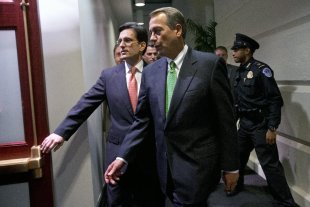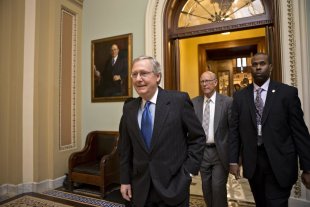WASHINGTON (Reuters) – In the wake of bruising fights in their own ranks over the “fiscal cliff” and aid for victims of superstorm Sandy – Republicans in the U.S. House of Representatives open a new Congress on Thursday more divided than ever.
While their leader, Speaker John Boehner, seems in no danger of losing his position because of the divisions, his ability to speak for his membership in the House appears greatly diminished.
That could not come at a worse time for Republicans as they prepare for their next attempt to get more spending cuts out of President Barack Obama. They will try to use the debt ceiling – and Obama’s request to raise it – as leverage, as they did in 2011.
But if the final days of this Congress were indicative of things to come, Republicans will have a rough time effectively using their majority in the House against Obama, who even Republicans acknowledge is at the top of his game following the Democrat’s re-election in November.
The fiscal cliff battle to avert steep tax hikes and spending cuts that were due to kick in at the start of this year proved gut-wrenching for Republicans.
Obama’s demand for a tax hike on the rich challenged a core principle that has guided Republicans for decades: No new taxes. Ever.
Yet, late on New Year’s night, 85 Republicans in the House did just that, voting to raise income taxes on household income of more than $ 450,000 a year.
Some of the Republican Party’s biggest stars were among the 85 – including Boehner and Paul Ryan, the 2012 Republican vice presidential candidate, who is seen as a conservative anchor.
But 151 House Republicans stood in defiance, leaving Boehner in the unenviable position of having to rely on opposition Democrats to pass major legislation.
Earlier in the fiscal cliff fight, Boehner suffered a humiliating defeat when his “Plan B” solution – which would have limited the tax hikes to income of $ 1 million a year or more, got so little support he had to cancel the vote.
No sooner had the fiscal cliff battle ended than Boehner found himself in trouble with other Republicans over aid for victims of Sandy, the second costliest storm in U.S. history, which smashed New York and New Jersey coastal communities in late October.
Legislation providing disaster relief to New York, New Jersey and other East Coast states was delayed. A House Republican aide said that given Republicans’ frustration with the fiscal cliff bill and its lack of significant spending cuts, “it was not a good time to immediately vote on $ 60 billion in new spending.”
“I don’t enjoy saying this. I consider myself a personal friend of John Boehner’s,” said Republican Representative Peter King of New York. “It pains me to say this, but the fact is that the dismissive attitude that was shown … toward New York, New Jersey and Connecticut typifies, I believe, a strain in the Republican Party.”
Earlier, King had condemned House inaction on Sandy as a “knife in the back.”
Republican Representative Michael Grimm, also of New York, said of Boehner’s refusal to bring the disaster bill to a vote: “There was a betrayal. There was an arrogant judgment that is going to cost I think the trust of the American people.”
Ironically, Grimm first won his seat in Congress in 2010 with the help of conservative Tea Party activists who sometimes show displeasure with disaster aid spending.
By midday on Wednesday, Boehner had changed course, promising a House vote by week’s end on a $ 9 billion down payment in storm assistance, with a second bill providing $ 51 billion to be voted on January 15.
TEA PARTY EFFECT
Paul Light, a New York University professor and a specialist on Congress, said the vote on the fiscal cliff bill could mark the start of a “major realignment” in the run-up to the 2014 congressional elections and the 2016 presidential race.
Republicans who voted for the legislation “are going to have to find a home. They’re not going to find it with the Tea Party,” Light said.
He said that Republicans who were uncomfortable with the Tea Party could begin aligning themselves more closely with a dwindling band of centrist Democrats.
Congressional Republicans, especially in the House, have been buffeted for two years by the Tea Party, which helped them win control of the House in 2010.
Boehner had to navigate Tea Party demands throughout the 2011 fight over raising U.S. borrowing authority or risking a historic government default.
In rapid succession, Tea Party-fueled battles were waged over infrastructure investments, farm subsidies, payroll tax cuts and the fiscal cliff.
At the core of the disputes was whether the government should be made smaller, forcing Boehner to balance that demand with the need to govern and keep the federal government operating in an orderly way.
For all the heartache over the past several weeks as Republicans fought with one another over whether to let taxes on the rich go up, many see better days ahead.
“By and large, people are probably happy to have it behind them. This was obviously the worst part of the fiscal debate,” said one House Republican staffer, referring to the tax hikes.
The staffer added, “Republicans get to point out that we still have a $ 1 trillion deficit and ask Democrats what kind of spending cuts, entitlement reforms they are willing to do to fix it.”
Republicans feel that will be an easier lift for them – one that they can sell to the American public as they move on to the fight over the debt ceiling.
(Editing by Fred Barbash and Peter Cooney)
Health News Headlines – Yahoo! News
Title Post: Analysis: Republicans start new Congress bruised and divided
Url Post: http://www.news.fluser.com/analysis-republicans-start-new-congress-bruised-and-divided/
Link To Post : Analysis: Republicans start new Congress bruised and divided
Rating:
100%
based on 99998 ratings.
5 user reviews.
Author:
Thanks for visiting the blog, If any criticism and suggestions please leave a comment













